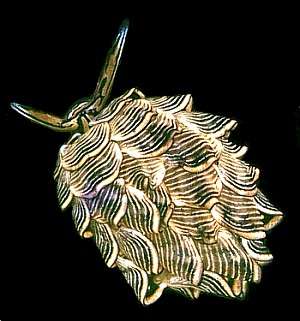
Cyerce nigra
Bergh, 1871
Order: SACOGLOSSA
Superfamily: LIMAPONTIOIDEA
Family: Caliphyllidae
PHOTO
Chuuk, Ueno, reef flat; 15mm long. 2 July 1973. Food unknown. PHOTO: Clay Carlson.
Described from Palau, this animal is usually considered a colour form of Cyerce nigricans. It differs in having a pattern of transverse stripes on the outside of the cerata rather than the spots of typical Cyerce nigricans. Both species have spots on the inside surface of the cerata. Another difference is that there is a thin black line then a broad yellowish band at the edge of the cerata in Cyerce nigra but in Cyerce nigricans there is a thin white line, then a broad black band, then the broad yellowish band.
See Clay Carlson's message below.
Reference:
• Bergh, L.S.R. (1870). Malacologische Untersuchungen. In: C.G. Semper, Reisen im Archipel der Philippinen, Wissenschaftliche Resultate. Band 2, Heft 1: 1-30, Pls. 1-8.
Rudman, W.B., 1999 (July 6) Cyerce nigra Bergh, 1871. [In] Sea Slug Forum. Australian Museum, Sydney. Available from http://www.seaslugforum.net/find/cyernig2
Related messages
Cyerce nigra from Milne Bay, Papua New Guinea
July 6, 2007
From: Clinton Bauder
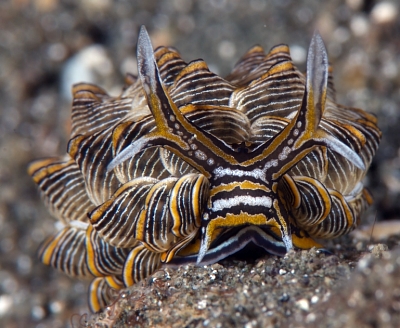
Hi Bill,
Thanks for re-opening the forum! I'll try to contain my enthusiasm and limit my entries to the more interesting critters I've found.
This is Cyerce nigra (presuming it is distinct from C. nigricans ).
Locality: Dinah's Beach/Lauadi, 10 meters, Milne Bay, PNG, Pacific, 5 April 2007, Sandy Bottom with occasional coral. Length: 20 mm. Photographer: Clinton Bauder.
Clinton
gecko1@apple.com
Bauder, C., 2007 (Jul 6) Cyerce nigra from Milne Bay, Papua New Guinea. [Message in] Sea Slug Forum. Australian Museum, Sydney. Available from http://www.seaslugforum.net/find/20115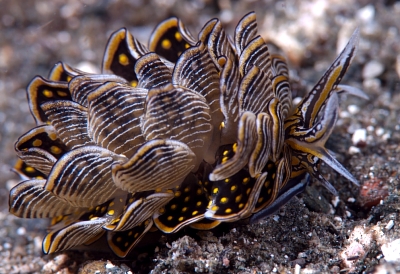
Thanks Clinton,
Photos like this are very useful in building up information on colour variation. If we are going to work out whether C. nigra and C. nigricans are different species, we will need photos like yours to show how consistent the colour differences are - then all we will need is someone to compare their anatomy.
Best wishes,
Bill Rudman
Cyerce nigra and C. nigricans – swimming behaviour
December 5, 2001
From: Julie Marshall
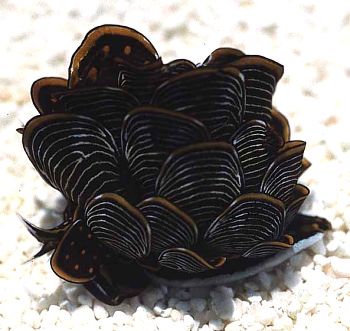
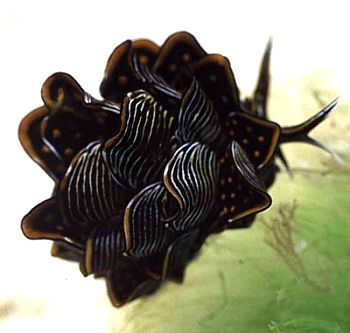
Dear Bill,
On a recent trip to Heron Island I found a Cyerce nigra moving across the sand flats at low tide. It was 18 mm in size. Although Cyerce nigricans is comparatively common at Heron Island this was the first time I have found this species with the transverse stripes on the outside of the cerata rather than the spots on both sides of the cerata of Cyerce nigricans.
When disturbed it swam very vigorously, much the same as I have observed with Cyerce sp. 1. I have not, however, ever seen Cyerce nigricans swim in this manner although I have picked it up and irritated it and have only observed it moving its cerata backwards and forwards - not vigorously swimming through the water. Is it possible that the swimming behaviour attributed to Cyerce nigricans is perhaps a confusion with the behaviour of C. nigra which some people think is a colour form of C. nigricans? I would be interested to hear of observations, or pictures of C. nigricans swimming. This could possibly be another distinguishing feature between the two species (as well as the pattern differences and the observations by Clay Carlson and Patty-Jo Hoff that C. nigra feeds on Udotea rather than Chlorodesmis). Note that although one picture shows some Chlorodesmis in the background I placed the animal on this alga – it was not feeding on it!
Best wishes
Julie Marshall
juliemarshall@netspace.net.au
Marshall, J., 2001 (Dec 5) Cyerce nigra and C. nigricans – swimming behaviour. [Message in] Sea Slug Forum. Australian Museum, Sydney. Available from http://www.seaslugforum.net/find/5738Thanks Julie,
It would certainly be interesting to hear of any other swimming observations of the two species.
Best wishes,
Bill Rudman
Cyerce nigra & C. nigricans
April 11, 2000
From: C.Carlson & P.J.Hoff
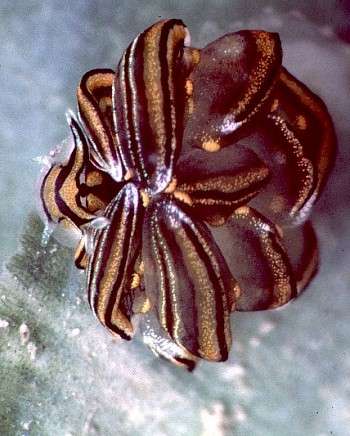
Bill,
Here is one of our scans of the juvenile Cyerce nigra I emailed you about in early March. This first record of it feeding is a piece of evidence to suggest it could be distinct from Cyerce nigricans.
Data: 4mm long; Guam, Bile Bay, 18m; 8 March 2000
The specimen was found on Udotea geppii and obviously fed on this algae
while we watched it for a couple of days in the lab. In the attached scan it had gotten most of the 'goody' to the left and is now working on the edge of the section. The banding on the part of the cerata facing anteriorly has just started on the first 2 pair of anterior cerata. The left rhinophore appears to show an early stage of bifurcation.
Clay & Patty Jo
Merizo, Guam
clay.carlson@kuentos.guam.net
Carlson, C. & Hoff, P.J. , 2000 (Apr 11) Cyerce nigra & C. nigricans. [Message in] Sea Slug Forum. Australian Museum, Sydney. Available from http://www.seaslugforum.net/find/2248Dear Clay & Patty Jo,
This is a very interesting find. It certainly suggests that C. nigra, feeding on Udotea, could be a distinct species, separate from Cyerce nigricans, which seems to feed exclusively on the filamentous Chlorodesmis.
Thanks for sharing this wonderful photograph with us. It's a pity this animal already has a name. With the colour pattern on its head "tigra" would have been a much more appropriate name then "nigra".
Best wishes,
Bill Rudman.
Photos of Cyerce
July 8, 1999
From: Clay Carlson
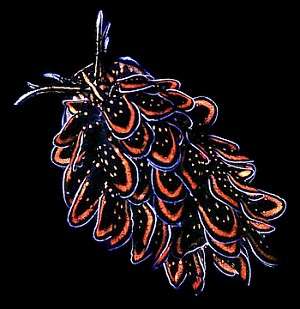

Bill,
Here are a couple of elderly Cyerce shots. Both were doctored up quite a few years ago for use as Xmas cards. We have a number of polybranchs but have not done much with the limited literature we have on the beasts.
UPPER: Cyerce nigricans Pease, 1866), 22mm; Guam, Bile Bay, reef flat; 2 April 1971. Host: Chlorodesmis fastigiata
[Bergh named this species Cyerce nigra var. ocellata Bergh, 1873; Samoa]
LOWER: Cyerce nigra Bergh, 1871, 15mm. Chuuk, Ueno, reef flat; 2 July 1973. Host: ?
Clay
Merizo,
Guam
clay.carlson@kuentos.guam.net
Carlson, C. & Hoff, P.J., 1999 (Jul 8) Photos of Cyerce. [Message in] Sea Slug Forum. Australian Museum, Sydney. Available from http://www.seaslugforum.net/find/1027Dear Clay,
Thanks very much for the photos. They may be old but they are better than mine. I've decide to keep Cyerce nigricans and Cyerce nigra separate. I am not sure they are distinct, but the colour differences are quite large, and keeping them separate may stimulate discussion.
Best wishes,
Bill Rudman.
